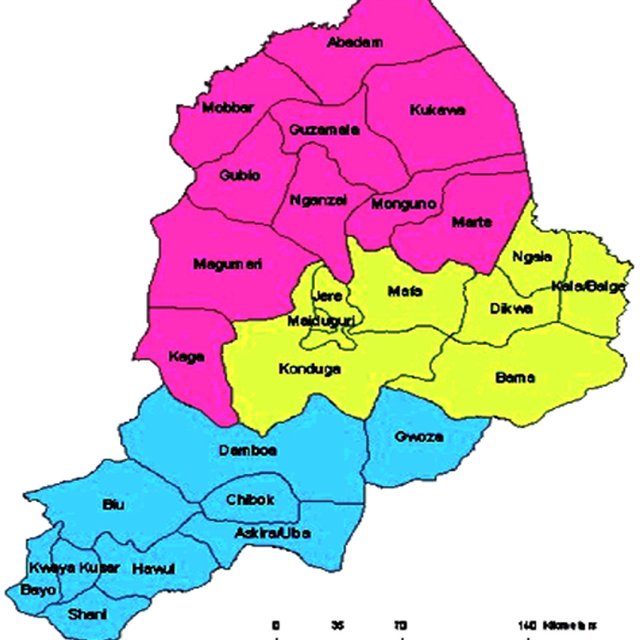While fireworks blasted the serene sky ushering in the New Year, the Kanem Borno region of Nigeria, comprising Borno and Yobe states, wished Nigerians and the world a happy, PEACEFUL and prosperous year.
Peace is emphasised here because the people of Kanem Borno of today have realised that while “health is wealth”, “peace is everything”. Remember, Borno and Yobe are the most badly affected states in the North East of Nigeria by the Boko Haram insurgency.
In recent months there is relative peace in the states. While we the people of the region give thanks and praises to Allah for His mercy, we give kudos to the federal government, as well as the governments of Borno and Yobe states.
The Kanem-Bornu Empire (700AD-1893CE) lasted for nearly a thousand years between the 11th and 19th centuries during the Christian Era (CE). It was first known as the Kanem Empire (700AD-1617CE) and later as the Kanem-Bornu Empire (1617-1893CE). Famous historians such as Vincent Heribarren have described it as “the longest empire in the history of Africa”. Some parts of this article are culled with permission from Dr Hiribarren’s famous work, “A History of Borno: Trans-Saharan African Empire to Failing Nigerian State”, published in 2017 by C. Hurst & Co. Ltd, London.
At its peak, the Kanem-Borno Empire controlled land in the regions known today as Western Chad, North Eastern Nigeria, Southern Libya, Eastern Niger and Northern Cameroon. It was located in the Southern end of the trans-Saharan trade route between modern Algeria, Libya and the Lake Chad Region.
While the empire’s official histories extend from 700CE-1893CE, its roots can actually be traced back to 300CE in the shadow of the Tebu-speaking nomadic Kanembu in Kanem State established in the Eighth Century between Lake Chad and Bahr Ghazal in the Kanem Region in modern Chad.
The the Kanembu to abandon their nomadic life around Lake Chad. They established a capital around 700CE called Njimi under the first king of Kanembu, Seif.
The Kanembu were under the leadership of the Duguwa Dynasty and they eventually controlled the Sao Civilisation after waging a war that lasted till the late 16th Century. Although Kanem was restored in the 16th Century, the imperial capital remained at Bornu, present-day Borno. That is why we call it the Kanem-Bornu Empire.
Army
The Kanem-Bornu Empire became powerful by conquering its neighbours in war. Its military power relied mainly on light and heavy cavalry, but also on the efforts of its talented political leader, Idris Alauma, in the second half of the 16th Century. According to legend, Idris Alauma won 330 wars and over 1,000 battles – and although, this is perhaps an exaggeration, he made an important contribution to the Kanem-Bornu Empire.
Borno Kingdom
Bornu was an area South West of the Lake Chad. The Kanem Empire temporarily relocated there after their wars with Bulala resumed as Bulala took control of Kanem’s capital, Njimi, and the surrounding areas. Bornu proved so important to the relocated Kanem Empire because the lands there were more fertile than in Kanem.
Moreover, when King Mai Ali Ghaji came to power in 1472CE, he established strong trade links with some Hausa kingdoms (present-day Northern Nigeria). He also built the city of Ngazargamu near the Yobe River which later became the capital of the Kanem Empire in Bornu.
The Empire
The Kanem-Bornu Empire was officially known as the Kanem-Bornu Empire by 1617CE. This date refers to the unification of the Kanem and Bornu regions. Mai Idris Alauma had three sons who followed their father’s example and increased the prosperity of the empire. Mai Muhammad (1617-1632CE), Mai Ibrahim (1632-1639CE) and Mai Amman (1639 -1657 CE) expanded education and learning in the empire.
Finally, the chequered history of the empire remains indelible in the glorious pages of African history in general and Nigeria in particular. Apart from giving us a sense of identity, history also gives us a sense of direction and makes us appreciate our diversity. Our diversity should be the source of our unity as a nation. Borno, the nucleus of the Kanem Borno Empire is dubbed “the home of peace”, hence the importance of peace not only to Bornoans and Yobeans, but also to Nigeria as a whole.
The enviable resilience of the present-day Kanem Borno despite the 13 years of Boko Haram cum ISWAP terrorism should be a source of inspiration for other parts of Nigeria bedevilled with one form of insecurity or the other, especially the North West where banditry and kidnapping for ransom are rampant.
While we wish Nigeria and Nigerians a bumper harvest of peace and prosperity in 2023 and beyond, we wish you all compliments of the season.
Adamkolo M. Ibrahim is Lecturer at the Department of Mass Communication, University of Maiduguri, Borno State, Nigeria.
Email: [email protected]u.ng
Zanna Ibrahim Mustapha is the Founder and President of Kanem Press Digital Hub, Nigeria.




